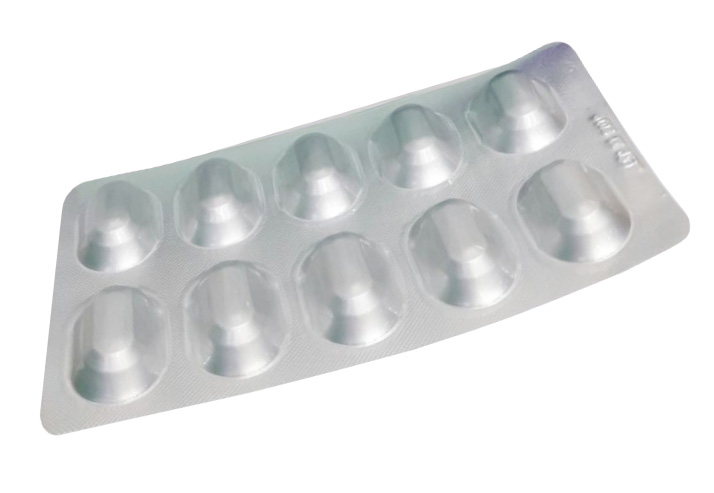Avelox
Avelox is a medicine intended for the treatment of bacterial infections. Avelox is a fluoroquinolone antibiotic with antibacterial activity against a wide range of bacterial species.
What Does Avelox Contain?
1 film-coated tablet contains:
Active ingredients
400 mg moxifloxacin in the form of moxifloxacin hydrochloride.

Excipients
Croscarmellose sodium, lactose monohydrate, magnesium stearate, microcrystalline cellulose, hypromellose, macrogol 4000 and the colourings iron oxide red (E172) and titanium dioxide (E171).
Uses
Avelox is used in adults for the treatment of infections caused by the following susceptible bacteria:
- acute inflammation of the sinuses (acute sinusitis);
- acute deterioration of chronic bronchitis (inflammation of the lower respiratory tract);
- mild, uncomplicated pneumonia contracted outside hospital;
- certain mild to moderate inflammatory conditions of the pelvis, i.e. infections of the female upper genital tract, including infections of the fallopian tubes and infections of the lining of the womb.
Avelox tablets are generally not sufficient for the specific treatment of this type of infection, so in addition to Avelox tablets, your doctor will prescribe another antibiotic for the treatment of mild to moderate pelvic inflammatory disease.
How To Take
It is up to your doctor to set the dose and duration of treatment. It is only by strictly following his or her prescriptions that you will derive the greatest benefit from Avelox. Swallow 1 film-coated tablet at the same time each day, without chewing, with sufficient liquid. You can take Avelox independently of meals.
When taking Avelox 400 mg film-coated tablets with food or drink: the effect of 400 mg film-coated tablets is not influenced by food, including dairy products.
Approximately six hours must elapse between taking a medicine containing certain metals (bi- or trivalent cations) and taking Avelox 400 mg film-coated tablets. These include magnesium- or aluminium-based antacids (medicines to treat gastric hyperacidity), didanosine tablets to treat certain viruses, sucralfate and medicines containing iron or zinc.
Avelox should not be taken at the same time as activated charcoal.
Unless your doctor advises otherwise, the duration of treatment will be:
- for acute deterioration of chronic bronchitis: 5 days,
- for pneumonia: 10 days,
- for acute inflammation of the sinuses (acute sinusitis): 7 days,
- for mild to moderate inflammation of the pelvis: 14 days.
Do not stop taking Avelox early, even if you feel better, otherwise your infection may not be completely cured. If you stop taking this drug too soon or for too short a time, you could trigger a new outbreak of your disease.
If you have accidentally taken more than one film-coated tablet a day, tell your doctor if you experience any side effects such as nausea or diarrhoea. Continue your treatment on the following day as prescribed.
If you have forgotten to take an Avelox film-coated tablet and there are more than 8 hours left until the next scheduled dose, take the forgotten film-coated tablet immediately. Then take the next film-coated tablet at the usual time. If it is less than 8 hours before the next scheduled dose, do not take the forgotten film-coated tablet. Then take the next film-coated tablet at the usual time.
Never take a double dose to make up for a missed dose.
If you stop taking Avelox, your condition may deteriorate. Tell your doctor if you wish to stop your treatment with this medication before it is due to finish.
There is no need to adjust the dose in elderly patients and patients with renal insufficiency or mild hepatic insufficiency. There are only limited data in patients with marked hepatic impairment.
Avelox should not be used in children and adolescents under the age of 18.
Do not change the prescribed dosage on your own initiative. Contact your doctor or pharmacist if you feel that the effectiveness of the medicine is too low or too high.
Side Effects
Hypersensitivity reactions (severe allergic reactions) which may progress to life-threatening shock (anaphylactic shock) may occasionally occur. These reactions can sometimes occur as early as the first dose. In these cases, you should immediately stop taking Avelox 400 mg film-coated tablets and inform the doctor treating you.
Symptoms of shock include cold sweat, gasping for breath, drop in blood pressure, rapid pulse, dizziness and fainting.
Other side effects may occur when taking Avelox:
Common (affects 1 to 10 in 100 users)
Fungus, headache, dizziness, nausea, vomiting, pain in the gastrointestinal tract and lower abdomen, diarrhoea and digestive disorders.
Occasional (affects 1 to 10 users out of 1000)
Visual disturbances, breathing difficulties (including asthmatic conditions), chest pain, anxiety states, excitement, hyperactivity, nervousness, heart palpitations, tachycardia (increased pulse rate), hypertension, dehydration due to diarrhoea or reduced fluid intake.
Anaemia, coagulation disorders, changes in blood count.
Allergic reactions, skin rashes, urticaria, skin redness, itching, sweating, oedema of the skin tissue, disturbances of sensitivity to touch (resulting in tingling in the arms and legs, sometimes accompanied by pain), disturbances of taste (including very rare cases of complete loss of taste).
Confusion, loss of orientation, sleep disorders, tremor, dizziness, drowsiness, inappetence, constipation, bloating, gastroenteritis ("gastrointestinal flu"), swallowing disorders, dry mouth, joint and muscle pain, non-specific pain, general feeling of discomfort.
Rare (affecting 1 to 10 users out of 10,000)
Hypersensitivity reactions (anaphylactic reactions), allergic oedema (fluid retention, oedema of the larynx is potentially fatal), angina pectoris, heart rhythm disorders. If you develop heart rhythm problems, tell your doctor immediately!
Jaundice, hepatitis, kidney function disorders, kidney failure (due to dehydration, particularly in elderly patients with pre-existing kidney disease).
Hyperglycaemia or hypoglycaemia, especially in diabetics.
Emotional instability, depression (in very rare cases leading to self-destructive behaviour, e.g. suicidal ideation/attempts). In very rare cases, this may lead to self-destructive behaviour, e.g. suicidal ideation/attempts), hallucinations, confused thinking, loss of consciousness, marked hypotension, fluid retention, reduced sensitivity to touch, smell disorders (including cases of complete loss of smell), insomnia, abnormal dreams, coordination and balance disorders (including gait disorders due to dizziness and drowsiness, which in very rare cases lead to falls with injuries, particularly in elderly patients).
Convulsions of varying clinical intensity (including tonic-clonic convulsions, known as "grand mal" seizures), attention deficits, language disorders, hearing disorders up to and including deafness (generally reversible), memory loss, asthma, ringing in the ears, neuropathic symptoms such as pain, burning, tingling, numbness or weakness, tendonitis (inflammation of the tendons), muscle hardening, muscle cramps, muscle weakness, leg or pelvic pain, back pain, arthritis, rapidly developing fatigue, tenosynovitis (inflammation of the tendon sheaths), dry skin.
Inflammation of the oral mucosa (glossitis), intestinal inflammation (colitis; in very rare cases associated with life-threatening complications). If you experience severe diarrhoea during or after antibiotic treatment, consult your doctor immediately. Do not take preparations that inhibit intestinal movements (intestinal peristalsis).
Very rare (affects less than one user in 10,000)
Serious skin reactions including Stevens-Johnson syndrome and toxic epidermal necrolysis. These may appear on the trunk as red, target-shaped patches or circular plaques often with central blisters, desquamation (peeling of the skin), ulcers of the mouth, throat, nose, genitals and eyes and may be preceded by fever and/or flu-like symptoms (potentially life-threatening).
Liver function disorders that may progress to life-threatening liver failure. Symptoms of liver failure: general weakness or exhaustion, jaundice (yellow discolouration of the skin, mucous membranes and sclera), dark discolouration of the urine, increased bleeding tendency or a condition known as "hepatic encephalopathy", which is characterised by personality and behavioural disorders, reduced facial movement and expression, tremors, twitching of the eyelids and other muscle tremors. If you notice any of these symptoms, you should consult your doctor immediately!
Transient loss of visual acuity.
Personality disturbance (depersonalisation), psychotic reactions (including self-destructive behaviour, such as suicidal thoughts or suicide attempts).
Worsening of symptoms in cases of myasthenia gravis, tendon rupture, gait disorders (caused by muscle, tendon or joint disorders).
The use of fluoroquinolone antibiotics has been associated with very rare cases of long-term (several months or years) or permanent side effects, such as tendonitis, tendon rupture, joint pain, pain in the limbs, difficulty walking, unusual sensations such as tingling, pins and needles, tickling, burning, numbness or pain (neuropathy), depression, fatigue, sleep disorders, memory disorders, as well as deterioration of hearing, sight, taste and smell, disorders of the central or peripheral nervous system or muscular disorders, in some cases independently of the existence of risk factors.
Unknown frequency (cannot be estimated on the basis of available data)
A generalised red, scaly rash with lumps under the skin and blisters, accompanied by fever at the start of treatment (Acute Generalised Exanthematous Pustulosis, AGEP).
Muscle weakness, tenderness or pain, particularly if at the same time you feel unwell, have a temperature or dark urine. These signs and symptoms may be caused by abnormal muscle breakdown, which can be life-threatening and lead to kidney problems (a condition called rhabdomyolysis).
If you notice any such symptoms, you should notify your doctor immediately.
Cases of widening and weakening of the aortic wall or tearing of the aortic wall (aneurysms and dissections), which can rupture and be fatal, and leakage of heart valves have been reported in patients receiving fluoroquinolone.
If you notice any side effects, please inform your doctor or pharmacist. This applies in particular to side effects not mentioned in this package leaflet.
Precautions
Like some other antibiotics, moxifloxacin causes an abnormality in cardiac activity visible on the ECG (electrocardiogram = recording of the heart's electrical activity). Tell your doctor if you suffer from heart problems and/or if you need to take other medicines.
Fluoroquinolone/quinolone antibiotics have been associated with very rare but serious side effects, some of which were persistent (lasting months or years), impaired quality of life or were possibly permanent. These side effects include tendon, joint and muscle pain in the upper and lower limbs, difficulty walking, unusual sensations such as tingling, pins and needles, tickling, numbness or burning (paresthesia), sensory disturbances including impaired vision, taste, smell and hearing, depression, memory impairment, severe fatigue and sleep disturbance.
If you notice any of these side effects while taking Avelox, consult your doctor immediately before continuing treatment. You and your doctor will decide whether treatment should be continued with an antibiotic from another group of active ingredients.
Moxifloxacin may cause serious adverse reactions affecting different organ systems, which may occur simultaneously. These include tendonitis and tendon rupture, joint pain, neuropathic symptoms and psychiatric reactions. These adverse reactions may occur within hours or weeks of taking Avelox and may affect patients of any age, as well as patients with no pre-existing risk factors.
Tendon inflammations and tears may occur during treatment with quinolones and fluoroquinolones during the first 48 hours after the start of treatment, and in some cases even several months after the end of treatment. The risk is higher if you are elderly (over 60), if you have had an organ transplant, if you suffer from kidney problems, if you are being treated simultaneously with corticosteroids or if you are involved in strenuous physical activity. Stop this treatment as soon as pain or the first signs of inflammation appear (e.g. painful swelling of the ankle, wrist, elbow, shoulder or knee), immobilise the affected limb and inform your doctor immediately. Avoid any unnecessary movement that could increase the risk of tendon rupture.
In patients treated with fluoroquinolones, e.g. moxifloxacin, neuropathic symptoms such as pain, burning, tingling, numbness or weakness have been reported. Such neuropathy may develop rapidly. If you notice such symptoms after taking Avelox, you should stop treatment and contact a doctor immediately. In this way, the possible risk of irreversible nerve damage can be reduced.
Psychiatric reactions (e.g. nervousness, agitation, insomnia, anxiety states, nightmares, paranoid thoughts, confusion, tremor, hallucinations and depression) may also occur after the first dose of Avelox. In very rare cases, depression or psychotic reactions have worsened and led to suicidal ideation or self-destructive behaviour such as suicide attempts. If you experience such symptoms or thoughts after taking Avelox, you should stop treatment and contact a doctor!
Fluoroquinolone antibiotics may trigger convulsive seizures or lower the convulsive threshold. If convulsive seizures occur, treatment with Avelox should be discontinued. Consult your doctor if you suffer from epilepsy or other disorders of the central nervous system (e.g. lowering of the convulsive threshold, history of epileptic seizures, reduced cerebral circulation, altered cerebral structure or cerebrovascular accident). In these cases, Avelox, like other medicines in this class, should be used with caution.
Please discuss this with your doctor before taking Avelox:
- if you have been diagnosed with a dilated or "bulging" large blood vessel (aneurysm of the aorta or peripheral aneurysm of a large vessel),
- if you have previously suffered an aortic dissection (a tear in the wall of the main artery),
- if you have been diagnosed with heart valve leakage (heart valve regurgitation),
- if there have been cases of aortic aneurysm or aortic dissection or congenital valve disease in your family or if other risk or predisposing factors (which favour) aortic aneurysm and aortic dissection are known (e.g. connective tissue diseases such as Marfan's syndrome, Ehlers Danlos syndrome, Turner's syndrome, Sjögren's syndrome [an inflammatory autoimmune disease], Takayasu's arteritis, giant cell arteritis, Behçet's disease, hypertension, known atherosclerosis, rheumatoid arthritis [a joint disease], or endocarditis [an infection of the heart]),
- if you have ever had a severe skin rash or peeling, blistering and/or mouth sores after taking moxifloxacin.
In addition, if you suddenly experience severe abdominal, chest or back pain, which may be symptoms of aortic aneurysm and dissection, go immediately to the nearest emergency department.
Your risk may be increased if you are being treated with systemic corticosteroids.
If you begin to experience rapid shortness of breath, particularly when lying flat on your bed, or if you notice swelling of your ankles, feet or abdomen, or a new onset of heart palpitations (a sensation of rapid or irregular heartbeats), you should inform a doctor immediately.
If you experience any problems with your eyesight or the organs of your sight, you should consult your ophthalmologist immediately.
Please inform your doctor if your liver function is reduced (Child-Pugh A and B according to your doctor). Treatment with Avelox has been associated with cases of sudden hepatitis (inflammation of the liver) which may progress to total liver failure. Symptoms may include:
- rapidly developing general weakness or exhaustion,
- jaundice (yellowing of the skin, mucous membranes and sclera),
- dark coloured urine,
- increased tendency to haemorrhage,
- a condition known as "hepatic encephalopathy", characterised by personality and behavioural disorders, reduced facial movement and mimicry, tremors, twitching of the eyelids and other muscle tremors.
If you notice such symptoms after taking Avelox, you must stop treatment and consult a doctor immediately!
Serious skin reactions including Stevens-Johnson syndrome, toxic epidermal necrolysis (also known as Lyell's syndrome) and Acute Generalised Exanthematous Pustulosis (AGEP) have been reported with the use of moxifloxacin.
Stevens-Johnson Syndrome and Toxic Epidermal Necrolysis (also known as Lyell's Syndrome) may initially appear as reddish patches on the trunk in the form of targets or circular plaques often with central blisters. In addition, ulcers of the mouth, throat, nose, genitals and eyes (red, swollen eyes) may occur. These severe skin rashes are often preceded by fever and/or flu-like symptoms. The rash may progress to generalised desquamation (peeling of the skin) and potentially life-threatening or fatal complications.
Acute Generalised Exanthematous Pustulosis (AGEP) appears at the start of treatment as a generalised red, scaly rash with bumps under the skin and blisters accompanied by fever. It is mainly localised in the skin folds, on the trunk and upper limbs.
If you develop a severe rash or any of these skin symptoms, stop taking moxifloxacin and contact or consult a doctor immediately.
Hypersensitivity and allergic reactions (e.g. rash) may already occur after the first use of quinolones. In very rare cases, anaphylactic reactions may progress to life-threatening shock. In these cases, moxifloxacin should be stopped immediately and medical treatment (e.g. treatment of shock) instituted.
Severe diarrhoea (pseudomembranous colitis) may occur during treatment with antibiotics. If you develop severe diarrhoea during or after antibiotic treatment, consult your doctor immediately. Do not take preparations that inhibit intestinal movements (intestinal peristalsis).
If you suffer from myasthenia gravis (muscle disease), you should be cautious when using Avelox as symptoms may worsen.
Before taking Avelox, tell your doctor if you or anyone in your family suffers from glucose-6-phosphate dehydrogenase deficiency (hereditary or acquired metabolic disorder).
Since blood sugar disorders may occur when fluoroquinolones are used, close monitoring of blood sugar levels is recommended in diabetics. Please inform your doctor if you are being treated with insulin or an oral antidiabetic.
Activated charcoal inhibits the absorption of the active ingredient in Avelox. This is why this medicament must not be taken at the same time as activated charcoal.
In studies, moxifloxacin has shown only a slight risk of triggering photosensitivity. You should nevertheless avoid UV rays (UV lamp, solarium) and not expose yourself excessively to the sun during treatment with Avelox 400 mg film-coated tablets.
For the treatment of mild to moderate pelvic inflammatory disease, your doctor will normally prescribe another antibiotic in addition to Avelox. If there is no improvement in symptoms after 3 days of treatment, please consult your doctor.
This medicine contains less than 1 mmol (23 mg) of sodium per film-coated tablet, i.e. it is essentially "sodium-free".
If your doctor has informed you of an intolerance to certain sugars, contact him/her before taking this medicine.
This medicine may affect reactions, driving ability and the ability to use tools or machines. If you feel dizzy or have visual problems after taking Avelox, you should not drive or operate machinery.
When should Avelox not be taken?
You should not use fluoroquinolone/quinolone antibiotics, including Avelox, if you have previously experienced a serious adverse reaction when using quinolones/fluoroquinolones.
You should not take this medication if:
- if you are allergic to moxifloxacin, other quinolones or any of the other ingredients of Avelox,
- if your liver function is severely reduced (Child-Pugh C according to your doctor),
- if you have already suffered from tendon problems during previous treatment with similar medicines (quinolones),
- if you suffer from neutropenia (a reduction in the number of certain white blood cells) or if you have HIV or other diseases that weaken the immune system,
- if you have infections that may be related to a prosthesis,
- if you are under 18 years of age,
- if you have ever had symptomatic heart rhythm disorders,
- if your heartbeat is clinically significantly slowed (bradycardia),
- in the event of sodium balance disorders, in particular with a reduction in the concentration of potassium in the blood (hypokalaemia),
- in certain forms of heart failure,
- during pregnancy and while breast-feeding.
- If you are taking any of the following medicines, you should not take Avelox:
- certain antiarrhythmics (medicines to treat heart rhythm disorders),
- medicines that may lower potassium or magnesium levels,
- antidepressants,
- neuroleptics (medicines for anxiety and mental tension),
- certain antiallergics,
- cisapride (a drug that speeds up gastric emptying),
- certain antibiotics,
- certain anti-malarial drugs.
What else do you need to consider?
This medicine must not be used after the date shown after the words "EXP" on the container.
Notes on storage
Keep out of the reach of children.
Do not store above 25°C.
Keep the container in its carton to protect it from moisture.
Additional information
Do not remove the film-coated tablets from their original packaging until immediately before use.
After treatment, return the remaining contents to your point of sale (doctor or pharmacist) for proper disposal.
For further information, consult your doctor or pharmacist, who have detailed information for professionals.
Pregnancy and Breastfeeding
If you are pregnant or breast-feeding, you must not take Avelox.
Pelvic Inflammatory Disease
The female reproductive system consists mainly of the ovaries, fallopian tubes, uterus and vagina. These organs are vulnerable to bacterial infection, which can be caused by poor hygiene or sexually transmitted diseases.
Chlamydia and gonorrhoea, for example, are caused by bacteria that enter the vagina during sexual intercourse. These bacteria multiply in the warm, moist environment of the vagina, causing inflammation, pain and vaginal discharge. If left untreated, vaginal bacterial infections can spread to other internal organs. For example, bacteria can enter the uterus through the cervix.
In this case, the bacteria can infect the fallopian tubes, continue to multiply and create scar tissue. From the fallopian tubes, the infection can also spread to the ovaries and other abdominal structures, such as the bladder, intestines and pelvic walls.
Pelvic inflammatory disease, or PID, is the term used for widespread infection of the inside of the uterus, fallopian tubes and ovaries. Symptoms of PID can include vaginal discharge, chronic pelvic pain and fever.
However, the most serious consequence of chronic PID can occur during ovulation, when an egg is released from a woman's ovary. The scar tissue left by the bacterial infection can completely block the fallopian tubes so that the egg cannot pass into the uterus. The result is either infertility because the sperm cannot reach the egg, or an ectopic pregnancy, a medical emergency, in which the egg is fertilised and begins to grow in the fallopian tube.
If you have any symptoms of sexually transmitted diseases or PID, consult your doctor. Early detection and treatment are vital to avoid unfortunate medical outcomes.



